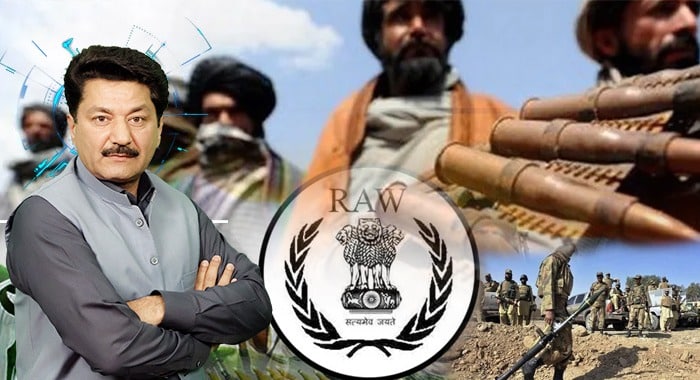Fida Adeel
For decades, Pakistan has withstood the trauma of terrorism, but the recent wave of violence in Khyber Pakhtunkhwa (KP) and Balochistan reveals something far more sinister a sustained, covert war engineered by India through proxies, propaganda, and strategic destabilisation. The silence of the international community in the face of this aggression is alarming, especially when undeniable proof continues to surface from within India’s own intelligence community.
In a stunning admission, Aghwan, a former Indian intelligence chief, confirmed that Amarat-e-Islami one of the terror outfits orchestrating attacks inside Pakistan—has been receiving funds from India. This isn’t speculation. This is an insider’s confession, validating what Pakistan has been warning the world about for years: New Delhi is not just meddling; it is orchestrating bloodshed through covert operations across our western regions.
From the first wave of militancy to the present security crisis, the Indian spy agency RAW (Research and Analysis Wing) has been the architect behind a network of terror. These funds and operational directives rarely come directly into Quetta or Peshawar. Instead, they are routed through third-party states like Afghanistan and the UAE, where intermediaries execute missions under the guise of insurgencies, exploiting porous borders and fractured tribal regions.
Today, the consequences of this hybrid warfare are visible in the shattered lives and bodies strewn across KP and Balochistan. Civilians are dragged off buses and executed for their ethnicity. Checkpoints manned not by the state, but by militants, dot areas that should be under firm government control. In Bajaur, Mardan, Chitral, and the southern districts of KP, we see a disturbing erosion of state authority, replaced by the flag of fear.
This is not just lawlessness. This is the collapse of the state’s writ in strategic border regions. When militants have the audacity to set up their own checkpoints and conduct search operations, it is not merely a security lapse—it is a statement that they are in control, not the state.
The tragic killing of Maulana Khan Zaib in Bajaur, the massacre of over 80 workers at a Jamaat-e-Islami convention, and the repeated targeting of Punjabi labourers in Loralai and other Baloch districts all point to a systematic campaign designed to fracture national unity. These are not isolated incidents. They are coordinated acts of terror meant to rip apart the social and ethnic fabric of Pakistan.
The people of Bajaur, who toil in every corner of Pakistan, deserve better. They are the backbone of our labour force, the unsung heroes of our economy, and yet their homes have become killing fields. Their grief is our collective failure.
Despite these grim realities, the KP provincial government under Chief Minister Ali Amin Gandapur has begun taking initial but notable steps. A high-level security meeting was convened, and a decision made to form a fact-finding committee to visit all sensitive districts and consult with stakeholders. Meanwhile, peace marches are gaining momentum across KP and the tribal belt—Bannu, Mir Ali, Tirah, South Waziristan, and Bajaur—offering a powerful, civilian-led message: the people want peace, and they want it now.
But peace cannot come from marches alone. The state must respond with clarity. We are now at a critical crossroads where only two options remain: a decisive military operation to eliminate terrorist hideouts or a negotiated settlement. However, neither option is being pursued decisively because of a deeper issue political paralysis.
Political parties are bitterly divided on the issue of counterterrorism strategy. Some favour talks, others demand force, and many remain non-committal, lost in political point-scoring while blood continues to flow. This disunity has paralysed national response, leaving the police force designed to combat crime, not insurgency exposed and overwhelmed.
We must acknowledge that terrorism is not petty crime. Our police, tasked with arresting murderers and drug dealers, cannot face trained insurgents carrying out strategic ambushes and assassinations. Counterterrorism demands national consensus, military coordination, and cross-border intelligence operations. It cannot be outsourced to under-equipped police stations and overburdened local administrators.
Meanwhile, India hides behind its own mask of victimhood, pushing narratives like the fictitious “Operation Sindoor” to mislead its domestic population. In truth, India has suffered humiliating failures—downed aircraft, lost pilots, and shattered illusions of military supremacy. But rather than accept defeat, the Modi government doubles down on the lie, feeding its population a war fantasy it can no longer control. This addiction to militarism and manufactured nationalism has become India’s curse and Pakistan’s challenge.
This war isn’t new. Since 1947, India has sought to undermine Pakistan from manipulating the Kashmir issue to fomenting unrest in our western regions. Today’s proxy warfare in KP and Balochistan is simply a new phase of an old obsession: breaking Pakistan by bleeding it from within.
It is now time for Pakistan to respond not only with strength, but with strategic clarity. We must expose India’s role at every international forum. We must rebuild the writ of the state in KP and Balochistan through a combination of hard power and community-led peacebuilding. And above all, we must forge unity between political parties, between provinces, and between the state and its people.
Every day we delay is another day surrendered to those who want to see Pakistan fractured, weakened, and bled dry. The line has been drawn. Either we act decisively or continue to bury our children under the rubble of silence.





